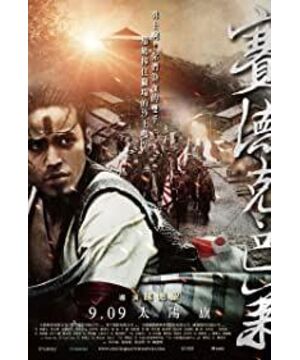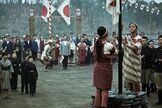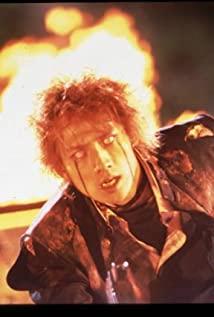"In 20 years, it will not be Seediq! There will be no hunting ground!"
-------- "Seediq Bale. Sun Flag
" Under the waterfall at the foot of Tianshan Mountain, I met a group of Uyghur children.
Twenty or thirty people played songs I couldn't understand on the tape recorder and danced with passion.
I feel their happiness is pure.
This is the memory that flashed in my mind when I saw those Seediks who cut down trees in the movie and saw the rainbow in the sky and finally couldn't help but get up.
According to the film, the Seediq believed that the rainbow was a bridge to the ancestors and the eternal hunting ground.
It is the deepest destination and belief of their souls.
There are real Seediq men and women, and all their distant ancestors.
So even when they cut down the trees that saw their ancestors hunt for a living, when they saw the Rainbow Bridge, they couldn't help but remember their songs.
Coincidentally, the bridge across the waterfall pool at the foot of Tianshan Mountain is also called Rainbow Bridge.
I once walked on the top of Nanshan Ranch and lamented that Kazakh yurts could only be tied up in concrete.
In the books and ballads I once read, they all shouted outside the Tianshan Mountains, drinking enough ice and snow water, riding a thousand miles, with eagles flying on their shoulders.
But on that day, the tourists and I looked at them in fur with a peculiar look.
There are also herdsmen holding horses to sell us a ride back and forth.
Some tourists choose to try, some tourists can't dodge, and most of them still look at them strangely.
I remembered that I had seen all the uncivilized treasures I had seen with those eyes.
Many times I hear people talk about how good our policies for ethnic minorities are. They eat, drink, and do nothing, and they treat the people preferentially.
Before we went, they drank blood; after we went, their party policy Yaxie.
And then we can't help scolding them at the end of the discussion, just like the Japanese complain about the savageness of the Seediqs in the movie.
In the movie, Dutchess said, "Boss, isn't it bad to be ruled by the Japanese? We now live a civilized life, with schools and post offices, and we no longer have to rely on savage hunting to survive as before. Ruled by the Japanese Isn't it good?" Does
this sentence sound a little familiar?
I once met a passenger returning from Tibet by train. Fun, cheerful and friendly.
When he talked about what he had seen, it was like a surging river couldn't close his mouth.
He said that the life of Tibetans is really good. We built roads for them and arranged housing for them. It turned out that they had nothing. Now education and life have followed suit. I don't know happiness.
I asked him how he felt about the spiritual life of Tibetans.
He mentioned the beliefs of Tibetans, like their raw yak and butter tea, which make people feel pious and primitive.
When we talked about some sensitive customs, suddenly there was a sentence next to you, you don't understand!
Only then did we realize that the person sitting beside me was a Tibetan in Chinese clothes.
Yesterday I told Lei Bitch that civilizations do not differentiate between superiors and inferiors, and no nation is high or low.
You can see any ethnic group you don't want to see with a colored eye, but you can't absolutely determine who is more advanced than who.
Maybe we Han people have more knowledge of science and technology than many other ethnic groups, and have more ability to make money, but when we see our compatriots begging, we no longer have the support of the Uyghur people with one heart and one mind.
We Han people may use more guns and collect more resources than many other ethnic groups, but when we recall the heritage our ancestors left us to preserve, do we still have the same pride as the Tibetans in our eyes? ?
How many banners of our fathers have we trampled on, how many songs of our ancestors have we forgotten, how many of our sincerity have been betrayed.
When we see that many ethnic minorities are wearing our clothes, we can say that they have all been sinicized.
And when we can't remember where we came from after so many years, we will still cry proudly as in the past, "We want to stand in the forest of nations in the world?"
I quoted that quote at the beginning, Mona Ludo said, "It won't be Seediq in twenty years!"
Yes!
Substances can be interchanged, technology can be learned, and what is never confused and can never be retrieved after discarding is the heart that truly belongs to its own group.
We have been bloodless for a long time. This is what a netizen wrote in Sediq Bale's afterthought.
Coincidentally and ironically, while I was watching this good movie, there was half-finished Ching-Japanese War on the table.
That war is the root of the Seediq Bale story.
The Qing was defeated and Taiwan was ceded; Japan took over and lost civilization; traditions were wiped out and rebellion was aroused; heroic souls returned to God, and their blood lasted forever.
The data in the book is shocking. The Qing-Japanese War was fought from North Korea to the Northeast, and from the Northeast to Shandong. Finally, after the Qing ceded Taiwan, the Japanese were allowed to take over Taiwan by themselves. Another fight.
What happened at the end?
The total number of killed in the Qing Dynasty was 25,000 (estimated), of which 14,000 were killed in the Taiwan rebellion; 13,488 Japanese soldiers died, of which 10,841 were killed in Taiwan.
There are the death battles of the Han Chinese in Taiwan and the death battles of the Gaoshan Fans.
I don't want to analyze the old sayings of the Qing Dynasty when the country was tired and the people were stupid. I just want to sing and dance like the Seediq people to sing about the glory of some people.
Because after all, it was not only the Chinese people who were bloodless at that time, aren't most of us now slaves of money and power?
We have long forgotten a lot of things that a nation should inherit on the grounds of civilization, and then leisurely wrote the two numb words of reason on the traces after erasure.
In the movie, Ta Dao asked Mo Na, why do you still fight when you know you will definitely lose this battle?
Mona said, for the soon forgotten totem! You look at these young people, with their pure and white faces. . . . There is no totem that Seediq should have. Do you have the heart to watch their dead souls be abandoned by their ancestors? Or do you think they are not qualified enough? To be a Seediq Bale with blood on his hands?
Tadori asked straightforwardly, exchanging his life for the totem mark. . . . So what can I get in exchange for these years of life? !
Mo Na said confidently, proud! !
It's an emotion that we've all discarded for so many years, so long and so vague. It is so long that everyone has forgotten it, and it is so vague that everyone doubts its truth.
As if we never had.
I only hope, but beg us not to let ourselves get it back.
View more about Sai de ke · ba lai: Tai yang qi reviews











